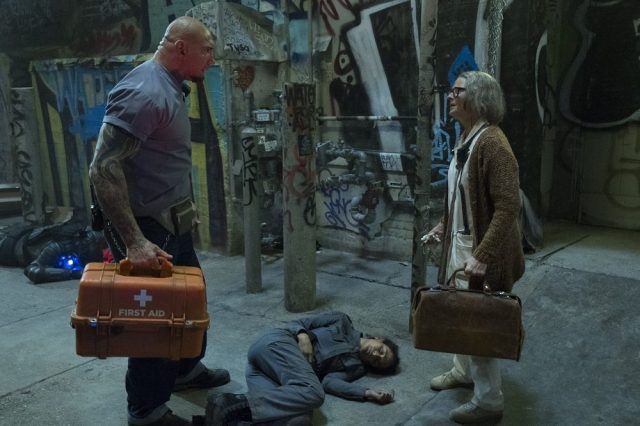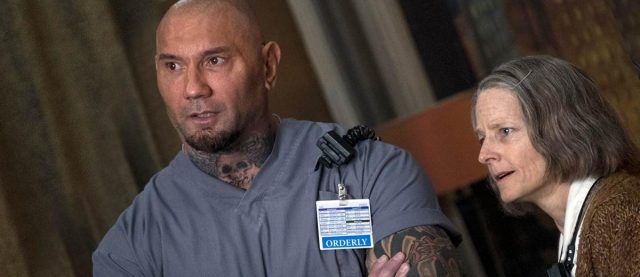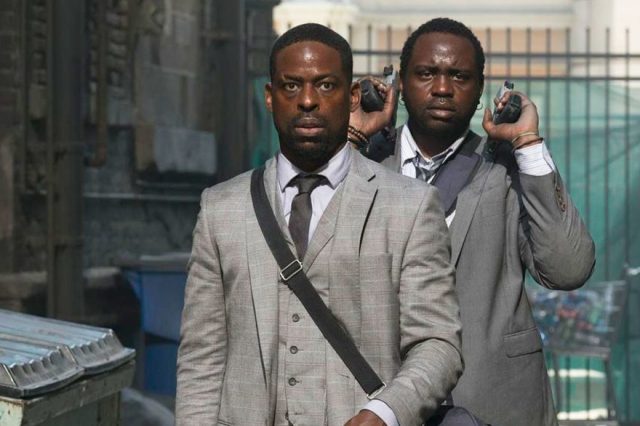Hotel Artemis is an interesting mix of claustrophobic thriller throwback and eccentric character piece. It’s an under-the-radar movie that appears to proudly target geeky audiences, and seems almost destined to become a cult favourite among independent film enthusiasts with a taste for criminal intrigue. A writing and directing effort from Iron Man 3 and Mission: Impossible – Rogue Nation scribe, Drew Pearce, Hotel Artemis clearly wants to wear a few genre hats, and appears to very blatantly take inspiration from the exotic Continental hotel, one of the best world-building elements in the superb duo of John Wick movies that we’ve gotten so far.

The difference in Hotel Artemis however is that it not only takes place in a near-future, riot-ravaged Los Angeles, but also treats its titular location as more of a safe haven than a networking and resource center. It’s an incredibly cool concept, and as a character piece, Hotel Artemis offers plenty of satisfactory enjoyment for the modest cult audience that will inevitably find it. That said however, the best thing about Hotel Artemis is its concept, since its diluted focus and paltry budget appears to hold back a lot of its true potential. There is enough enjoyment here to satisfy those interested, but compared to the John Wick movies especially, Hotel Artemis may also leave you wanting a bit more than what it ultimately delivers.
The cast of Hotel Artemis is exceptional for the most part. The movie’s leads virtually all consist of criminals that are taking refuge in the titular Hotel Artemis, during an especially nasty riot that has pretty much taken over the entire city of Los Angeles in 2028. Said criminals include Sterling K. Brown’s bank robber and his unruly, injured brother (and very briefly an equally unruly Kenneth Choi as part of Brown’s gang), Sofia Boutella’s sultry assassin, and Charlie Day’s snarky arms dealer. You never find out these characters’ true names, since one of the rules at Hotel Artemis is that everyone is assigned a code name based off of the theme of the suite they stay in; Brown is Waikiki, Boutella is Nice, and Day is Acapulco. Later in the movie, Jeff Goldblum also joins the ensemble as a high-rolling crime boss code-named Honolulu, and is one of the best elements of the criminal ensemble for sure, which is why it’s disappointing that he doesn’t have a larger part in the movie.

In fact, with the exception of Brown’s Waikiki, you don’t always see as much of the supporting cast as you’d like. Even Zachary Quinto’s antagonist, the pushy son of Jeff Goldblum’s character, doesn’t have that much screentime in the end, leaving most of Hotel Artemis to instead be carried by lead actress, Jodie Foster, portraying Hotel Artemis’ owner and lead nurse, Jean Thomas, though she’s often simply referred to as, “The Nurse”, in keeping with the hotel’s rules about not disclosing identities. It’s through Jenny Slate’s character, a cop that ends up needing to seek help from the wrong side of the law, that we delve a little bit into the backstory of The Nurse, which takes up a surprising amount of the movie’s storytelling. This makes for a great showcase for Foster, who hasn’t appeared in a movie since her villainous role in 2013’s Elysium, but this direction also leaves Hotel Artemis with an uneven sense of character balance, over-focusing on some character elements, while leaving too little to the imagination with others.
There are also a few big character contrivances that will prove difficult to ignore for those who are inclined to pick movies apart. These are most evident with Dave Bautista’s otherwise highly enjoyable role as The Nurse’s assistant and muscle, Everest, a hulking, but deceptively big-hearted bruiser who ends up stealing much of the movie and running with it, keeping pace with Foster in the other big highlight role. That’s not to say that the rest of the supporting cast necessarily disappoints however, with Brown, Boutella, Goldblum and Day mostly playing to type as their respective criminals, albeit to pretty positive effect, especially in Goldblum’s case. Quinto however is somewhat left in the dust as a disappointingly weak antagonist that feels more loud and whiny than he does truly imposing or dangerous, and this probably isn’t helped by the fact that he logically shouldn’t be a threat to any guest in the entire hotel, all of whom are noticeably more dangerous, professional and capable.

When the characters do shine though, they really shine. It’s Foster and Bautista that end up carrying most of the production, but there are still some very cool moments with the other players, particularly Boutella, who does sport several of the most memorable moments in the movie with Nice. That’s why it’s a bit frustrating that Hotel Artemis can only do so much with its ensemble, whether due to budget limitations or an over-fixation on The Nurse. We don’t really learn too much about the other personalities beyond The Nurse, including Everest (though Goldblum’s Honolulu at least has a nicely implied reputation, even compared to the other criminals), but that isn’t a completely ineffective approach, since Hotel Artemis clearly wants viewers to fill in the blanks themselves in a lot of places. That does lead to a pretty cool cinematic sandbox to immerse yourself in, but it might have been even better if Hotel Artemis had managed to commit to more action and/or violent style to go with its interesting setting and cool personalities.
Hotel Artemis is all about suspense and intrigue, so it’s one of those movies that quickly plays a lot of its narrative cards close to the vest. What is most defined about the movie’s storyline and world however are two things; The future sucks (yes, even independent movies still appear to love their dystopian futures), and the civilized nature of Hotel Artemis itself is built on very important rules, a la John Wick’s Continental. These rules include: No names, no fighting, hurting and/or killing the other criminals staying at the hotel, no insulting or attacking the staff, only members are permitted, and no criminal business can be conducted at the hotel itself. This has Hotel Artemis essentially functioning as a hospital and getaway location for evildoers, wherein injured criminals can be treated without having to worry about police attention (if they’re members), and criminals looking to lay low can hide from their pursuers (again, if they’re members).
As I said, the idea of putting these unrepentant villains together in a confined location is something that absolutely oozes with potential, especially when Jodie Foster’s Nurse is so polite and good-natured by contrast. There are some great moments when Hotel Artemis really taps on that potential too, providing some standout story highlights that really flex the creativity of this entirely original production. The violence and thrills are ultimately too few and far between though, which is quite disappointing, considering how primed this movie should have been for both. The first act of Hotel Artemis feels especially clunky in some places, leading to a story kick-off that doesn’t do the best job of truly explaining what the movie is about, or what audiences are supposed to truly invest in.

By the climax however, you do get a bit more in terms of violent deaths and other inevitably broken rules on the neutral ground. albeit still not very much of it, all things considered. While there’s enough bright story spots here to avoid a lasting feeling of disappointment, it’s not enough to make Hotel Artemis feel like something truly special, at least outside of its very cool premise. When the movie commits to either being a crafty character thriller or a lovably cheesy 90’s action blockbuster throwback (albeit with the style of an indie film), it can be a lot of fun in the moment, but it also could have used a bit more consistency in terms of what is actually exciting about this story.
Drew Pearce directs Hotel Artemis on top of writing the script and producing, in his feature film directing debut. The other most noteworthy project that Pearce has directed is the Marvel One-Shot short film, All Hail the King from 2014, though that was definitely a well-made short, and fortunately, Pearce manages to hold his own with his first feature-length directing effort here as well. Again, Hotel Artemis sometimes could have used a bit more style in its directing flourishes, but the actual set design throughout the movie is superb, with the titular Hotel Artemis being as much a star of the movie as its characters. Similarly, Pearce manages to capture some decent intensity from the riot-infested, near-future Los Angeles surrounding the hotel, though disappointingly, Pearce also doesn’t often manage to make the future-era Los Angeles riots truly feel like more than an occasional backdrop to the more intriguing events unfolding within Hotel Artemis itself.

In being able to direct from his own script however, Pearce definitely captures some awesome money shots during the movie’s highlight moments, which I couldn’t possibly spoil in good conscience. The direction does sometimes feel hampered by a lack of experience on Pearce’s part, but when he gets it right, he does show quite a lot of potential as a scrappy action/thriller director. The slicker shadiness of John Wick’s Continental was obviously an example of a more impressive take on this kind of setting (though in fairness, it was also put together on double the budget in its debut), but even if it doesn’t truly pop as much as it deserved to, Hotel Artemis is clearly made with love, and both the director and actors appear to be having a great time making the movie. Thus, the movie does have an infectious charm, even during its slower moments, so long as you’re not expecting a full-bore action movie, at least.
Considering the strong cast it’s assembled, and how much effective intrigue it managed to build with those personalities, you’ll wish that Hotel Artemis did more with its concept than it ultimately does. There are some amazing highlight moments here and there, but there are also many other moments where you’ll feel like something was, “Almost badass”, or, “Almost exciting.” Hotel Artemis sometimes feels like it just barely misses the mark in terms of making its story and thrills consistently stand out, leading to a well-conceived and engrossing claustrophobic character thriller with inspiration that ultimately feels bigger than its execution. In a perfect world, this might lead to sequels that can hopefully play with a bigger budget, and Hotel Artemis does sometimes flirt with the idea of being the start of a franchise, like its blatant muse, John Wick ended up being, though considering its box office pittance especially, it seems much more likely that this movie will end up standing alone, and that’s a shame.

For what it is though, Hotel Artemis is a very cool experiment in villain-driven filmmaking, which seems to be on the rise in smaller-scale action-thrillers lately. It’s a modestly-sized movie that invites the imagination and entertains with its likable edge, even if there’s a disappointing shortage of actual violence throughout much of the runtime. It may not ultimately be all that it could have been, but for those looking for an interesting break from the usual Summer blockbuster fare of this season, Hotel Artemis is worth checking out as a charming curiosity. Writer/director, Drew Pearce will probably have better and more noteworthy projects in his future career, but for his first feature directing effort, Hotel Artemis glimmers with promise, and does engage while it lasts. It may not manage to kick nearly as much ass as the duo of Keanu Reeves vehicles that quite clearly inspired it, but Hotel Artemis does manage to prove that there are more ideas to explore with the concept of ruthless career criminals that are forced to play nice at their favourite getaway spot.

